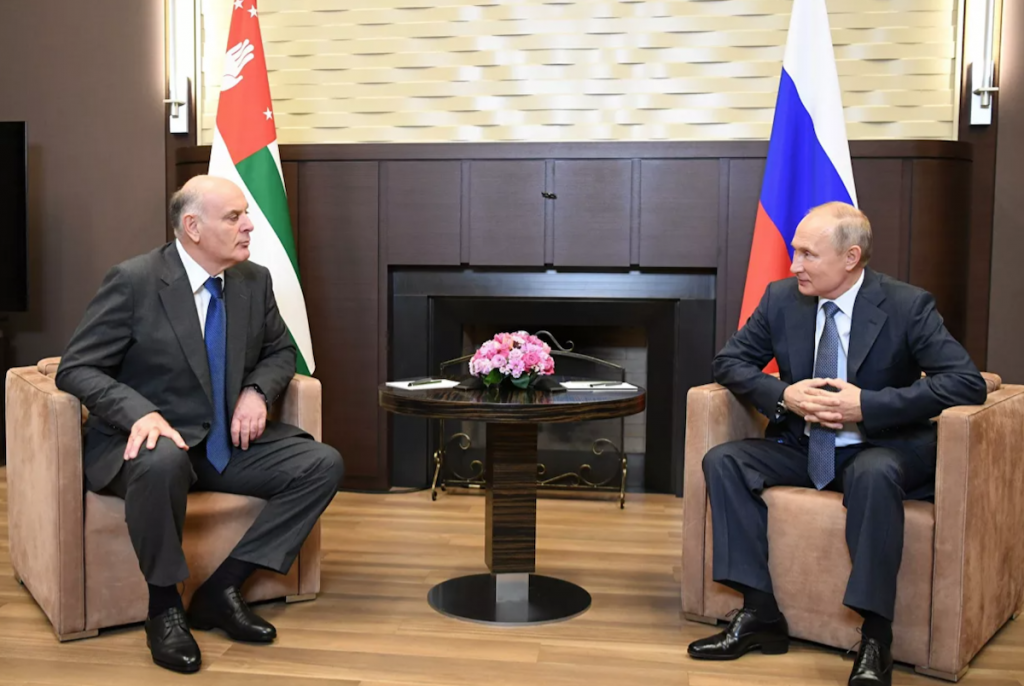Op-Ed: Abkhazia needs Russian money, but it might come at a high cost
The first meeting of President Aslan Bzhania with Vladimir Putin has sparked great expectations in Abkhazia. Most importantly, this concerns Russian financial assistance, which is vital for Abkhazia to overcome the crisis caused by the global pandemic. However, this time Moscow expects Abkhazia to fulfill a number of conditions.
These conditions are very unpopular in Abkhazia, and not a single previous president has ever dared to agree to them. However, this time, the Abkhaz authorities are torn between two fires and will might need to make difficult decisions, says Inal Khashig, editor of JAMnews in Abkhazia.
Long-awaited meeting
Many wonder why President of Abkhazia Aslan Bzhania has been so preoccupied with the idea of meeting with his Russian counterpart Vladimir Putin. For almost eight months he sought a personal meeting with him. He traveled to Moscow several times, unsuccessfully fiddling with Deputy Prime Minister Dmitry Kozak, who is in charge of relations with Abkhazia, until he finally got what he wanted.

Perhaps this has been the Kremlin’s intention all along – to bring the Abkhaz president right where they wanted him. For not every leader is ready to go into two weeks of self-isolation (one of the prerequisites for a meeting with Putin), but apparently it was necessary. Naturally, not to Putin, but to Aslan Bzhania.
At home, the situation is miserable. The treasury is so chronically empty, and then there’s the pandemic and an energy crisis. There are problems wherever you look. Naturally, Abkhazia needs money – a lot of money to somehow make ends meet and stabilize the situation in the country.
- Former Abkhaz VP: ‘Abkhazia must join Union State of Russia and Belarus’
- Abkhazia: pensioners suffering after pensions move from ATMs to banks due to fraud cases
And now Moscow is the only hope. But they are in no hurry to help Abkhazia on a large scale as they used to. There is a whole list of conditions under which Russia is ready to help.
What Russia requires
This list includes the lifting of the ban on the sale of real estate to Russians, and the admission of Russian companies to the energy system of Abkhazia, and allowing for Russian citizens to obtain dual Abkhaz citizenship, and the transfer of the New Athos Monastery to the Russian Orthodox Church, and many other little things.
Agreeing to these conditions, not even all but just a few, can cost the Abkhaz leader big upheaval, including losing the presidential seat. They are excessively unpopular among active Abkhaz citizens who periodically storm the presidential palace.
It should be noted that this list didn’t just suddenly appear today. It first appeared during the presidency of Sergei Bagapsh (2005-2011). He maneuvered as best he could until his sudden death.
Then this list nervously crumpled in the hands of the next Abkhaz President Alexander Ankvab until he was overthrown. Raul Khajimba, who replaced him, also shuddered every time when he was reminded of the Moscow agenda; however, by hook or by crook, he managed to delay the last judgement. Despite this, the republic had financial flows coming almost without interruption with all three presidents.
But now, apparently, the Kremlin has grown tired of waiting for the Abkhaz whim so they decided to follow the formula from Twelve Chairs [Soviet book and comedy film]: chairs in the morning – money in the evenings; chairs in the evening – money in the morning.
What Abkhazia is ready for
Overall, the current President of Abkhazia Aslan Bzhania won’t get away with it, unlike his predecessors.
And he is well aware of this. Nevertheless, Bzhania is not ready to take the first blow, which would be silly, so the movement started from below – with public figures, party and near-party activists.
Moreover, none of them even points towards Moscow, but simply, as if following a prepared cheat sheet, insists on the need for reforms.
The monologue began with the most painful topic – the issue of selling real estate to Russians. Activists claim Abkhaz will end up living their whole lives in need until they allow foreigners, i.e. Russians, to buy real estate in Abkhazia.
The speakers choose not to specify what this would actually bring to the treasury in monetary terms, and what are the risks associated with the process – for a positive outcome it is too dangerous to get into this debating jungle, because such calculations are non-existent, while the project bears more than enough disadvantages.
Despite the excessive noise background, both sides of the divide clearly understand that it’s impossible to resolve the issue by lifting the taboo on the sale of real estate to Russians overnight.
The parliament, which has this prerogative, is in no hurry to start discussing the issue. But even if it did, it would be besieged by outraged stormtroopers.
To sum up, it’s clear that the situation is a stalemate. However, Aslan Bzhania needs money now, not later, to achieve relative stability in the country. And his goal is to convince Putin that the process has begun, but he would like to get money up front.
Whether Vladimir Vladimirovich believes Aslan Georgievich is a rhetorical question.


















